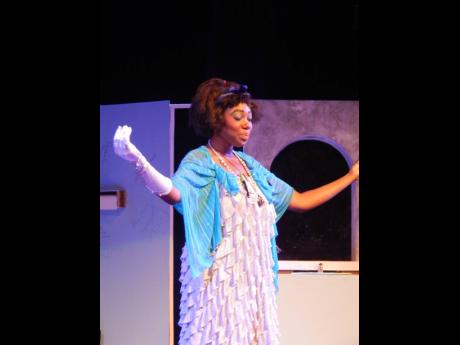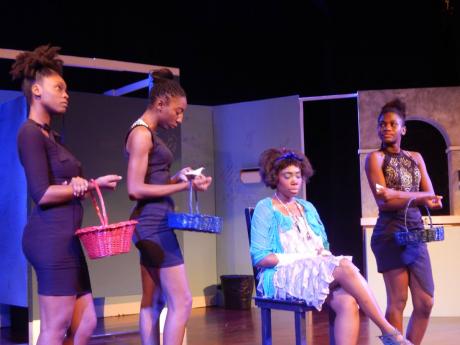‘Bathroom Graffiti Queen’ provides counsel
The intriguing title, Bathroom Graffiti Queen, that Opal Palmer Adisa gave to her play may suggest a fun show. But the piece is, in fact, quite harrowing.
Produced at The University of the West Indies’ Philip Sherlock Centre for the Creative Arts (PSCCA) over the weekend, it is scheduled for another staging specially for students at the end of the month.
It has powerful themes, most of them psychologically and/or sociologically distressing – like infidelity, rejection, abortion, mental illness, rape and other forms of sexual abuse – and no doubt the students, especially the females, will easily relate to them. This was demonstrated on Sunday night after the show ended.
It took several minutes for the all-female cast to recover from the emotional trauma they had experienced during their performance, and while they were centring themselves, from behind the curtain, psychotherapist and counsellor Dr Veronica Salter explained to the audience what the cast was going through. It had happened the previous nights of the show, she said.
Perhaps those audiences had also been upset, for Dr Salter spent some time calming us down on Sunday, as well. When the curtain did open, Palmer Adisa was on stage with the cast, one of whom was too distraught to stop crying.
In most shows, the cast shed whatever characters they were embodying and, as themselves again, bow, smiling, to the audience. On Sunday night, the cast was serious-faced as they bowed. We could see for ourselves the truth of Palmer Adisa’s statement, “The girls had a difficult time.”
Palmer Adisa also directed the play, and in her Director’s Notes, she explains that the story is set in the early 2000 on the University of California Berkeley campus. In the women’s restrooms there, apparently, numerous “personal stories” were written on the walls.
“As the playwright and director,” Palmer Adisa writes, “I feel it is necessary to share these stories unfiltered, to let you inside, to ‘kotch and hear’ how these women feel and how they cope with the onslaught of abuse.”
An indication of the show’s continuing and universal relevance is the fact that in the last couple of decades, it has been staged around the USA and the Caribbean some dozen times. Interestingly, it seems to work as both a one-woman show and with an ensemble cast.
The title role of the current production is brilliantly played by Shanice McCatty, who started acting with the University Dramatic Arts Society 10 years ago. She is clearly serious about the performing arts, as not only has she continued to act in various plays, but she has pursued training in stage management, sound production and lighting for the stage and has also been working in film/video.
LADIES-IN-WAITING
As graffiti queen, she has ladies-in-waiting, played by Adriel Palmer, Staisha Campbell and Jahmiela Nunes. They also portray other characters, including students and adults with various emotional problems – some involving other people, some just conflicting parts of themselves.
The acting is excellent, with the cast showing their versatility by adopting different mannerisms and speech – and sometimes costumes – for their several characters. There are many because the bathroom graffiti queen takes on the job of counselling each woman with a problem.
She has problems herself, one of them being a missing daughter – real or imagined, we are not sure. The other is that she is mentally unbalanced. Why the playwright chose to make her “heroine” an unreliable character and not one of the mental health specialists scattered around the university is a question worth a research paper or two.
It’s no use asking the playwright. She might have an answer, but since the idea would’ve come from her subconscious, one can’t be certain that is the answer is “correct”. However, I did ask her about the genesis of the play. She replied (by email):
“I wrote this place because while teaching at UC Berkeley, I saw that woman students really needed a place to share and I was surprised that they chose the restroom to write their questions and their responses, and so that was the genesis of the play. I then saw that they were writing about certain themes: abortion, child abuse that they experienced, many women were saying they thought they were lesbians, issues about getting pregnant and whether or not they should have an abortion and so, you know, pulling from what students were writing I developed the play.
“Also at the time, a number of homeless women were being evident, and they would go to the restrooms at campuses to clean themselves or as a place to stay warm during the day or during the night or whenever, and every once in a while I would try to engage one of these women; sometimes we spoke and sometimes we did not. However, I was seriously concerned about what led them to this place and you know it was also the time when missing children were very much in the news and they were on milk boxes and stuff like that and I wanted to put all of that together.”
Technical designer Nadia Roxburgh must be thanked for sensitive lighting and Alden-James Rossini for always attractive costumes – even when they are appropriately outrageous (for the queen).
The University Players, which started their productions in 1952, must also be congratulated for taking on this important work. As PSCCA Head Michael Holgate states in the programme’s message, “… it falls perfectly in line with the research-driven, social activist focus of the Player over the years”.



